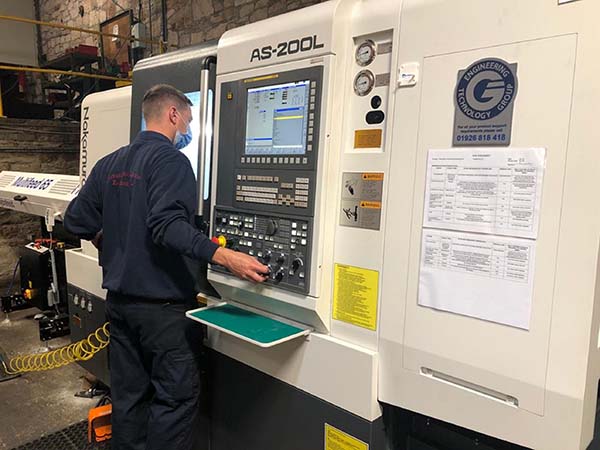
After winning a prestigious power generation project to turn critical stainless steel components, subcontract manufacturer Fairbrother & Grimshaw (Engineering) Ltd recognised that it needed to reconsider its machining strategy to improve cycle times and shop-floor throughput. The upshot was the arrival of a Nakamura-Tome AS200LMYSF turning centre from the Engineering Technology Group (ETG).
Based in Cherry Tree on the outskirts of Blackburn, Fairbrother & Grimshaw has a long-established relationship with ETG that dates back to buying recognised brands for more than a generation, prior to some brands being rolled into the ETG portfolio. In 2017, the relationship with ETG really blossomed for the company when it acquired two Quaser MV184 three-axis machining centres with Nikken 4th-axis rotary units from ETG.
Commenting upon the previously acquired Quaser MV184 machining centres, Fairbrother & Grimshaw managing director Neil Grimshaw recalls: “We needed to replace an ageing Bridgeport machine and, after doing our due diligence, we bought a Quaser MV184 from ETG. We liked it so much, we had a second one installed. The quality of machines from ETG is second to none and this is equalled by their customer service and support. That is one reason why, when we looked at a new turning centre, we opted for the Nakamura-Tome from ETG.”
The 12-employee company had won a long-term contract for 50-off stainless 316 components each month; and the challenging parts required three operations on a turning centre followed by 4th-axis machining on one of the Quaser MV184 machines. Fairbrother & Grimshaw recognised an opportunity to expedite the process with one-hit machining, while acknowledging that if its existing CNC turning centre had a breakdown, completing the monthly order would be problematic. Despite extensive market research, the Nakamura-Tome AS200LMYSF won the day with its twin-spindle configuration, long-bed specification, milling capability and Y axis that provides a 90% increase in turning length. With a longer Z-axis travel and a Hydrafeed barfeed, the new addition supports the production of complete parts either via its 8-inch chucking capacity or 65 mm automated barfeeding capacity.

Installing the Nakamura-Tome AS200LMYSF delivered results immediately, as Grimshaw confirms: “The Nakamura is like having four machines in one. By using the Y-axis milling and the sub-spindle facility, our parts are coming off the machine in one-hit. The benefits include a drastic reduction in set-ups, the elimination of second-ops and an overall cycle time reduction of more than 50%.”
He continues: “One-hit machining reduces the manual handling of parts, reduces human intervention and improves the overall quality and consistency of a batch of parts. We’ve recently installed a new Axiom Too CMM and the parts coming off the Nakamura are not only high in quality with excellent surface finishes, but the dimensions are consistent with zero deviation.”
With nine CNC machining centres and four CNC turning centres, the new Nakamura-Tome AS200LMYSF is bridging the gap between the two departments, permitting more milling work to be completed in a single operation in the turning department. This is gradually increasing capacity in the milling department as fewer parts require secondary milling operations.

Grimshaw says: “While we primarily bought the machine for the power generation part, we are witnessing similar savings on other legacy work that we’re transferring to the Nakamura. For example, we have a regular 1000-off series run of washers for the rail industry that was previously two operations. By transferring this to the Nakamura, we are machining the parts in one-hit, alleviating milling work from our 4th-axis Quaser and reducing our cycle times by more than 30%. Furthermore, with the barfeed facility, we can run the Nakamura unmanned until the batch is complete – saving on labour costs. Likewise, we have a die component for the food industry that is required in volumes of less than 100-off and the two turning operations and three milling operations are now a single operation on the Nakamura.”
The objective is to move more work to the Nakamura-Tome AS200LMYSF, but for Fairbrother & Grimshaw there is no urgency in expediting all its work to the new acquisition.
“We are moving legacy components onto the Nakamura when the opportunity arises but, as a busy machine shop running a three-shift pattern, our shop-floor team has to gradually build their confidence and competence on the machine,” states Grimshaw. “In this respect, ETG has been absolutely fantastic in supporting our machinists with any queries or issues they may have. Another appealing factor with the new Nakamura-Tome AS200LMYSF is the large-screen CNC control system. Young engineers want to be using the latest technology and the Nakamura has this in abundance.”
As the company gains confidence with the Nakamura, the benefits will continue to surface for Fairbrother & Grimshaw.

“Although we bought the Nakamura-Tome AS200LMYSF for a particular job, we knew it would reap rewards with other components,” says Grimshaw. “As that comes to fruition, we are seeing set-ups, cycle times and manual input continually decreasing. Additionally, we’re seeing throughput, quality, consistency, surface finishes and even staff motivation improving as a result of the investment.”
“As our experience with the new machine grows, we have the opportunity to both alleviate the capacity burden from our milling department by completing more milling work on the Nakamura, and look for new types of work,” concludes Grimshaw. “We can already see the added potential this machine is giving us to enter new markets and take on more challenging work. This really does offer us some exciting opportunities, while making our business even more competitive.”
For further information
www.engtechgroup.com















